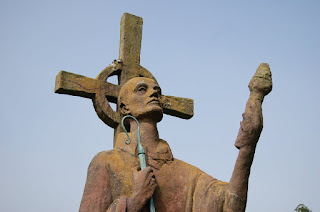There have been many surveys concerning the religious beliefs of the British public. It is obvious that we are now a much more secular nation than we were even twenty years ago. Belief in God has steadily declined over the years, especially among the young. In some parts of Britain only 22% of this group believe in God. Less than 7% of the public goes to a place of worship each weekend. This state of affairs contrasts strongly with the figures coming out of America, where there is an opposite trend. This can be seen in the figures given below.
Another worrying fact is the obvious ignorance displayed by even university educated adults. Recently we went on a tour of the Cambridge colleges. We started at the magnificent Kings College Chapel, a jewel late medieval perpendicular Gothic. The guide, obviously an educated man, pointed to the windows facing east and said, "This window sees the sun rising and as you know Christians worship the sun." I think he got confused with the other homophone!
Last evening there was a programme on the BBC asking the question Are Christians in Britain being persecuted? Many Christians in the UK feel that perfection is too strong a word, but they feel that Christianity is steadily being marginalised and that petty restrictions are being placed on believers in the workplace. Nurses and social workers have been threatened with dismissal if the don't stop wearing a cross etc, while Muslims seem to be free to wear veils and even hijabs. They feel that there is not a level playing field.
The UK and the USA compared
Many large-scale polls indicate that less than half the British public believe in God:
| Date | Details | Belief in God |
|---|---|---|
| 2008 | 1000 people were polled both in the UK and the USA and asked "Do you believe there is a God?". Less than 40% in the UK said yes, compared with 80% in the USA.14 | <40% |
| 2006 | 12507 people were polled, finding that only 35% in Great Britain believe in any kind of God or supreme being, compared to 27% in France, 62% in Italy, 48% in Spain, 41% in Germany and 73% in the USA.15 | 35% |
| 2006 | Poll of 4000 older teenagers in Cornwall found that only 22% could affirm that they believed in God, and 49% said they didn't.16 | 22% |
| 2003 | 1001 British adults surveyed4. | 60% |
| 2003 | 55% of the British public do not believe in a higher being17. |







